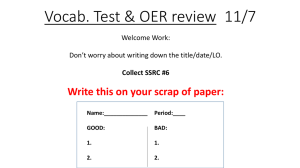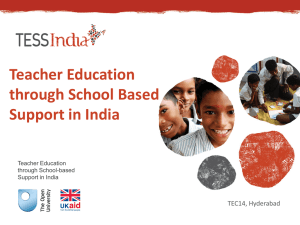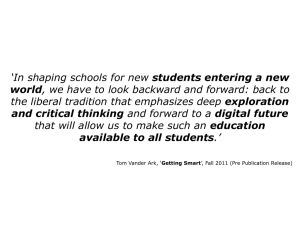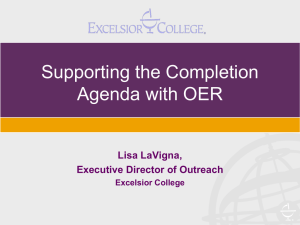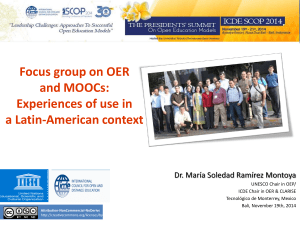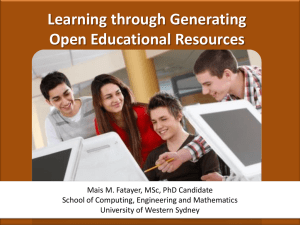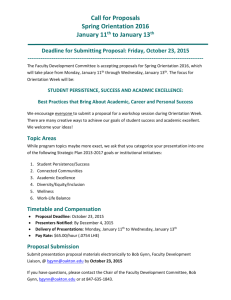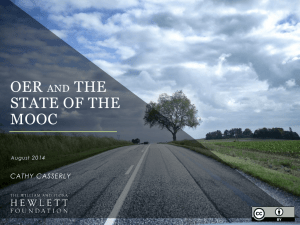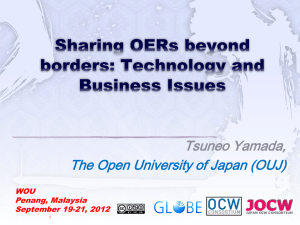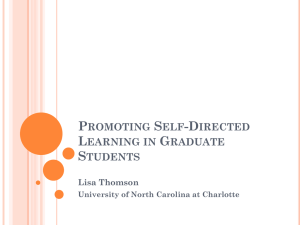Adult learners` comprehension on Open Educational - e-ASEM
advertisement
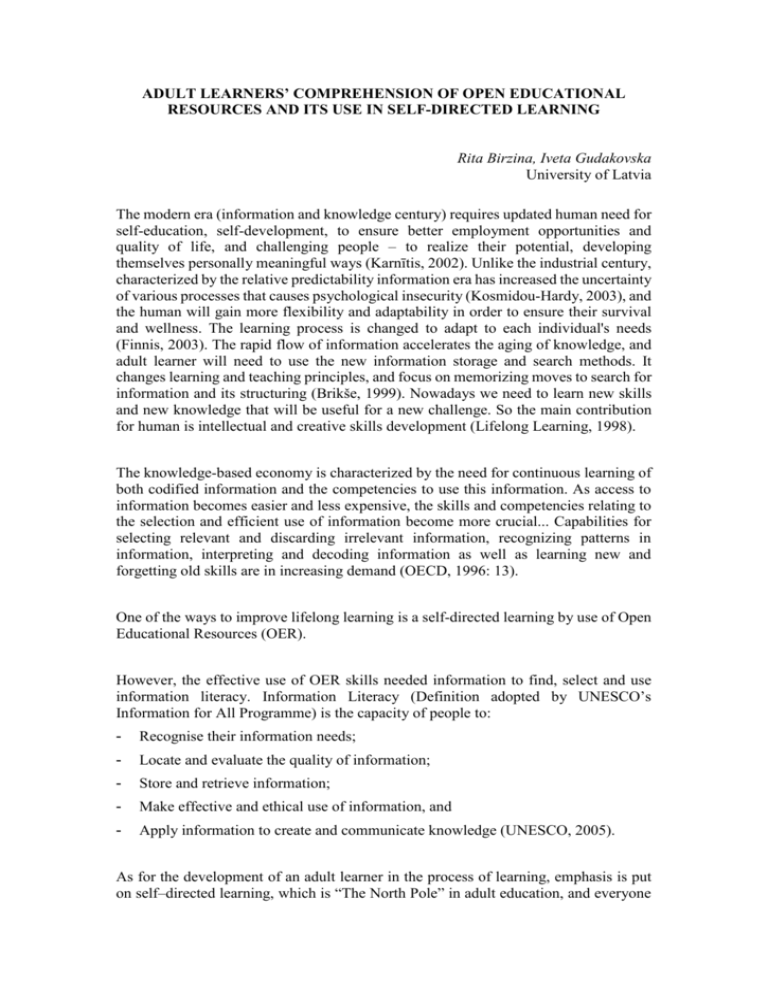
ADULT LEARNERS’ COMPREHENSION OF OPEN EDUCATIONAL RESOURCES AND ITS USE IN SELF-DIRECTED LEARNING Rita Birzina, Iveta Gudakovska University of Latvia The modern era (information and knowledge century) requires updated human need for self-education, self-development, to ensure better employment opportunities and quality of life, and challenging people – to realize their potential, developing themselves personally meaningful ways (Karnītis, 2002). Unlike the industrial century, characterized by the relative predictability information era has increased the uncertainty of various processes that causes psychological insecurity (Kosmidou-Hardy, 2003), and the human will gain more flexibility and adaptability in order to ensure their survival and wellness. The learning process is changed to adapt to each individual's needs (Finnis, 2003). The rapid flow of information accelerates the aging of knowledge, and adult learner will need to use the new information storage and search methods. It changes learning and teaching principles, and focus on memorizing moves to search for information and its structuring (Brikše, 1999). Nowadays we need to learn new skills and new knowledge that will be useful for a new challenge. So the main contribution for human is intellectual and creative skills development (Lifelong Learning, 1998). The knowledge-based economy is characterized by the need for continuous learning of both codified information and the competencies to use this information. As access to information becomes easier and less expensive, the skills and competencies relating to the selection and efficient use of information become more crucial... Capabilities for selecting relevant and discarding irrelevant information, recognizing patterns in information, interpreting and decoding information as well as learning new and forgetting old skills are in increasing demand (OECD, 1996: 13). One of the ways to improve lifelong learning is a self-directed learning by use of Open Educational Resources (OER). However, the effective use of OER skills needed information to find, select and use information literacy. Information Literacy (Definition adopted by UNESCO’s Information for All Programme) is the capacity of people to: - Recognise their information needs; - Locate and evaluate the quality of information; - Store and retrieve information; - Make effective and ethical use of information, and - Apply information to create and communicate knowledge (UNESCO, 2005). As for the development of an adult learner in the process of learning, emphasis is put on self–directed learning, which is “The North Pole” in adult education, and everyone who comes into contact with it tries to adjust the compass according to it (Grow, 1991). In the process of self–directed learning, adult learner undertake responsibility for planning their time, application of knowledge, and evaluation of their work (Liegeniece, 2002). An assumption concerning adults’ need to be self–directed has originated from M. Knowles’ andragogical model (Knowles, 1980); however, it is often wrongly interpreted distorting its original meaning. “Preference to self–directed process of learning” suggested by the author is often interpreted as “is self–directed” (Cranton, 1994), hence the frequent criticism referring to it. The concept of self–directed learning is analysed based on the ideas by Richard Dealtry (Dealtry, 2004) Ralph G. Brockett (Brockett, 1991), and Roger Hiemstra, as well as in connection with the contemporary topicalities of education, with a particular emphasis on the need for self-directed learning (Roger, 1969; Knowles, 1975; Cross, 1981). Despite the fact that already back in 1975 M. S. Knowles (Knowles, 1975:16) called self–directed learning a way of surviving, referring both to separate individuals and the whole mankind, it is even more topical nowadays and imparts ICT its “philosophical, practical, and pedagogic” (Herod, 2000, 2001) character. A pilot research is carried out for contribution to future collaborative studies in ASEM LLL Research Network 1 concerns to topic „Pedagogical approach to lifelong learning through OER”. The present pre-study was conducted during years 2013 for finding out a situation with OER in Latvia. The sample comprised of students of University of Latvia and teachers of general education schools in Latvia. The respondents answered to question relating to their conceptions of OER and its use. The aim of the pre-research is to study adult learners’ understanding about conception of OER and self-directed learning as a development of their information literacy. The research question: is there relation among adult learners' comprehension of what OER is, their information literacy skills, and self-directed learning? Two types of questionnaires were developed: one for students, other – for teachers in order to find out their views on use of OER. The qualitative data was obtained from respondents’ answers. The coding system, performed on the basis of conception of OER and information literacy, and theoretical knowledge about learning will be created for processing data. Qualitative data processing program AQUAD 6.0 will be used. The gained data show that there is considerable uncertainty about what is OER; many respondents did not know that they exist. Most popular OER formats used for students and teachers include videos, video-lectures, video-courses, movies, animations, interactive games and interactive tests. As key skills that are necessary for the use of OER are listed computer skills, language skills, information search skills, and critical evaluation of obtained information. The best practice examples of implementation of OER in learning are mentioned. Key words: open educational resources (OER), information literacy skills, self-directed learning References 1. Brikše, I., Vasiļjevs, A. (1999) Informācijas sabiedrība un jaunās tehnoloģijas. Pārskats par tautas attīstību Latvijā. UNDP, 71. – 89. lpp. 2. Brockett, R. G. and Hiemstra, R. (1991). Self-Direction in Adult Learning: Perspectives on Theory, Research, and Practice. London and New York: Routledge. 3. Cranton, P. (1994) Self-directed and transformative instructional development. Journal of Higher Education, Vol. 65, November/December. Ohio State University Press. pp. 726 – 744. 4. Cross, K. P. (1981) Adults as learners. San Francisco: Jossey-Bass Inc. 5. Dealtry, R. (2004) The savvy learner. In Journal of Workplace Learning. Vol. 16, No. 1/2, Emerald Group Publishing Limited, pp. 101–109. 6. Finnis, J. A. (2003) Learning in the Information Age. Available from (2005.28.07) http://www.dev.twinisles.com/research/learninfoage.htm 7. Grow, G. O. (1991/1996) Teaching Learners to be Self-Directed. Adult Education Quarterly, 41 (3), 125–149. 8. Herod, L. (2000) Integrating technology into canadian adult literacy programs: curriculum evaluation considerations. April 2000. Available from (2003.21.05) www.nald.ca/fulltext/herod/april/april.pdf 9. Herod, L. (2001) Computers in Adult Literacy: The Need for Curriculum Deliberation. New horizons in adult education. Volume 15, Number 1, Spring 2001. 10. Karnītis, E. (2002) Informācijas sabiedrība – iespējas ikvienam. E-pasaule. Bizness. Tehnoloģijas. Dzīves stils. Novembris, 6.–8. lpp. 11. Knowles, M. S. (1975) Self-directed learning: Guide for Learners and Teachers. New York: Association Press. 135 p. 12. Knowles, M. S. (1980) Modern practice of adult education: From pedagogy to andragogy. Revised and updated. Chicago: Follett Publishing Company, Association Press, 400 p. 13. Kosmidou-Hardy, C. (2003) Heuristic teaching: A model of critical Education Berlin European Media Literacy Conference II – 2003: "Learning Democracy". Conference paper, 44 p. 14. Lieģeniece, D. (2003) Mācīšanās bagātināt savu «Es» mūžilgās mācīšanās kontekstā. How to Develop Ego Identity in a Life-long Learning Process. 6th ATEE Spring University "Changing Education in a Changing Society" Riga, May 2–3, 100.–109. lpp. 15. OECD (1996) The knowledge based economy. Paris: OECD. 16. Roger, C. R. (1969) Freedom to Learn: A View of What Education Might Become. Columbus, Ohio: Charles E. Merrill Publishing Company. 352 p. 17. UNESCO (2008) Towards Information Literacy Indicators. Conceptual framework paper prepared by Ralph Catts and Jesus Lau. UNESCO: Paris.
